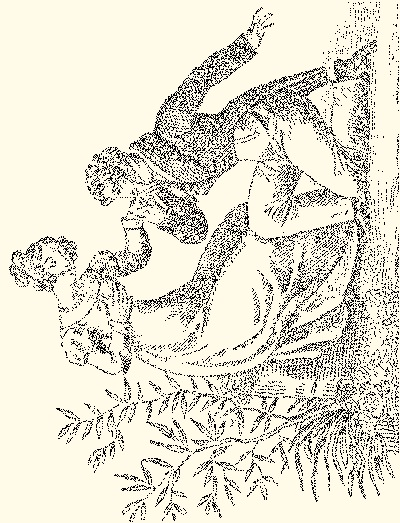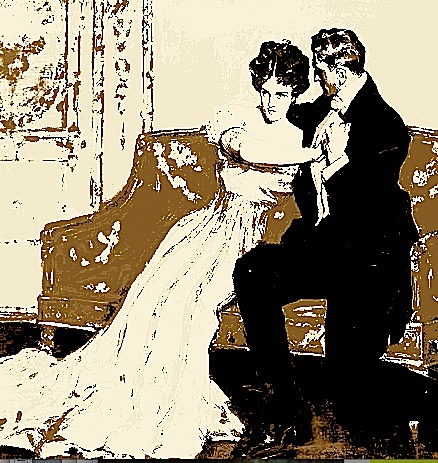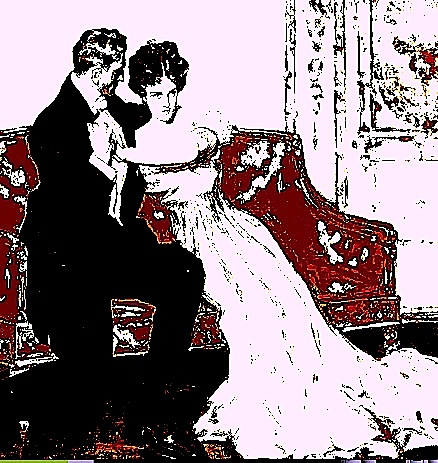I’m sorry about the uncharacteristically long silence, campers — and just before the deadline for The Sensual Surfeit Literary Competition of 2012, too. I’ve got to admit, in the welter of recent deadlines — you would be amazed at how many authors hold contracts specifying that they must deliver manuscripts or revisions immediately before or immediately after Labor Day — I had forgotten that the contest was ending so soon. And here I had planned to run a good dozen posts on incorporating strong, sense-based detail into narration, too.
So tell you what: I’m changing the deadline. Blogger’s prerogative. How does the beginning of December sound?
Seriously, I’m so swamped that I’m not sure I will be able to pull together a judging committee before that. And while I certainly plan to laud to the skies entries that have in fact made it in before the deadline, if I know writers — and I should, after seven years of blogging for and about them — I’ll bet that there are at least a few of you that honestly meant to pull together an entry by tomorrow, but just haven’t had the time.
Call me zany, but I’d like to hear from those folks. And I’d like to do it when I have time to read and enjoy their work. Which is a sentiment entirely appropriate to our topic du jour, how to handle multiple requests for submissions.
Last time — if you can remember back so far — we were discussing the sad tale of Hortense, a well-meaning, eager aspiring writer with a heart of gold and an itchy finger. Itchy, that is, to hit the SEND key or seal an envelope containing requested materials as soon as humanly possible after a real, live agent or editor has responded positively to a pitch or query.
Oh, it’s completely understandable: garnering a request for pages is darned exciting. What’s less understandable, from a professional reader’s point of view, is why a savvy writer would even consider responding to that request so rapidly that he does not have time to proofread the text first. Or to spell- and grammar-check it. Indeed, it’s not all that uncommon for aspiring writers to get so carried away that they simply send their entire writing file, rather than the number of pages the agent or editor requested.
I understand it: the writer believes that her big break is just around the corner; why hold off on leaping onto that charging locomotive? Especially when there’s so much chatter on the writers’ conference circuit to the effect that if a successful pitcher does not submit the requested manuscript before the agent or editor has a chance to forget that he made the request, she might as well not bother. Judging by the hefty percentage of successful pitchers that send out those pages before that agent or editor has time to pack, fly home from the conference, and stagger exhausted into his office, too tired to read, many pitchers evidently believe that the average pitch-hearer has a memory comparable to the lifespan of the common fruit fly.
Or so we must surmise, from the fact that so many submitters apparently believe that if the offer to read is not acted upon immediately, it will be dead in a week. Or two. Or, at maximum, six.
Successful queriers often succumb to the same urge, and not only because they, too, often conflate a request for pages with an imminent offer of representation. It’s not; it’s the first step toward that offer.
And a forest of raised hands crops up in the ether. “But Anne,” those of you who have felt the seductive pull of instant response, “I understand, at least intellectually, that any requested pages need to meet with the agent or editor’s approval before I’d receive an offer. I even get, because you harp on it so much here, that before the requester even sees my pages, they will probably have to make it past the sharp, ever-critical peepers of Millicent the agency screener. But isn’t it rude not to send out requested materials right away? I mean, if I don’t pop ‘em into the mail or hit SEND, won’t they suspect that I wasn’t prepared when I queried or pitched — and thus that my work is not ready to be published?”
In a word, no. Next question?
Just kidding: I know that there’s a lot of discussion to the contrary floating around out there. But think about it: in order for this to be the case, the requester would need to expect to see the requested materials right away — but hands up, anyone who has ever received such a request that said as much.
I spot a few hands out there. Would you still keep ‘em up if I modified the question to has an agent or editor ever asked you point-blank to send a manuscript within a specific, short window of time?
Wait, where did all of you go?
Such requests are exceedingly rare. It is exceedingly common, however, for aspiring writers new to receiving such requests to assume that I would like to see the first X pages could not possibly mean anything but I would like to see the first X pages, but only if you can get them to me within a day/week/month.
Tell me, rushers, under what conditions would it be reasonable for a pro to say the former, but mean the latter? I have actually received such a request for hyperspeed, and let me tell you, there was no ambiguity about it: I believe it took the form of, “Would you overnight your manuscript to me, as part of a two-week exclusive?”
Some of you rolling your eyes, am I not? “But Anne, I’ve read many places online that a manuscript must be 100% finished before it’s pitched or queried — and that if a writer wants to be taken seriously, he should be able to produce it on a second’s notice. If I waited, say, the two weeks it would take for me to read the requested pages IN THEIR ENTIRETY, IN HARD COPY, and preferably OUT LOUD, because that’s the best way to catch problems that I might not want the agent or editor of my dreams to see, that would harm my submission’s chances, right??”
Again, the short answer is no. But the long answer is substantially more interesting.
First off, the expectation that a manuscript would be complete prior to querying or pitching applies only to fiction; since nonfiction, including memoir, is generally sold in the U.S. on a book proposal, not a manuscript, most nonfiction books are sold before the writer has completed a full draft. And even for novels, it’s very, very common for both the agent and the acquiring editor to request revisions, so really, few professional readers harbor the illusion that any submitted manuscript is the final version.
Which means, in practice, that since any manuscript remains a work-in-progress until it is actually published and sitting on a reader’s shelf — and sometimes not even then — it would not be at all surprising if a writer conceived a wish to tinker with it a little before sending it out. Indeed, if tinkering makes the difference between a submission riddled with typos or not completely gelled on a story level and one that is, well, neither of those things, why wouldn’t an agent prefer to see the latter?
Equally pertinent, why would a writer not prefer to be judged on her most polished work?
Ah, you will say, but what about the suspicion that my work wasn’t already polished enough to submit? Let’s pause to consider what would have to be true in order for agents apply this particular criterion to judging a submission. First, the agency would need to care about speed of submission — which would be an easy thing to convey in a request, right? Second, even if they did care, they would need to hire someone to keep track of when the request went out and when the submission came in, right? In an era when agencies are laying off staff, why would they spend the money to double-check that requested materials arrived within a week, rather than within a month?
Now we have reached the core: they would want this information is if (a) they were looking for excuses to reject the submission unread, which would render the exercise of requesting it a waste of everyone’s time, (b) they were not aware that the overwhelming majority of such requests do not result in a submission (yes, really; writers get nervous), or (c) as soon as the agent issued the request, the agency blocked off a specific amount of time to read it and that time is darned soon.
I’m not saying that any of those things are impossible, campers; human preferences are notoriously variable. I’m merely asking you to consult probability on the subject of whether an agent’s making such a request must necessarily mean that she has nothing else to do until the manuscript arrives. Or that she would immediately drop all of her other work when it does arrive.
Are some of you blushing? ‘Fess up: deep in your heart, you did hope this was what would happen, didn’t you? But honestly, what are the chances that your manuscript was the only one the agent had requested recently? Or that, given the huge volume of queries any good agency receives, that there wouldn’t already be a backlog of reading by the time yours arrived?
Starting to make more sense that turn-around times are measured in months, not hours?
Calm yourself, blushers: this particular presumption is almost universal amongst first-time submitters, and not, I think due to over-large authorial ego. In my experience, most aspiring writers just haven’t thought about the practicalities of submission all that much. Or, if they do, they simply don’t know enough about how agencies actually work to make an educated guess.
Why is that problematic? Okay, let me ask you: what does the photograph at the top of this page depict?
Hard to tell when the viewer is so close to it, no? That’s more or less the situation faced by the first-time submitter: she — let’s call her Hortense — knows that she’s been asked to send all or part of her manuscript, but she doesn’t have the information to assess what that means in practice, precisely. So, if she’s like most first-time submitters, her guesses are based more upon what she would like to be true than what is actually the case.
Again, that’s understandable, but likely to lead Hortense astray. But if we encourage her to pull back a little, we can gain a bit of perspective.
Now we can at least see that it’s vegetable matter, but it’s hard to tell what kind or where it is. It’s certainly a clearer picture than we had before, though, right?
In case I’m being too subtle here, this is where Hortense is likely to end up if she derives her impressions of what a request for materials means from asking around. Listening to the common wisdom passed around at conferences. Trolling the Internet indiscriminately. Getting so freaked out by why she learns from either that her mental image of what’s likely to happen to her submission is based upon not her hopes, but her fears.
Starting to make more sense that most requested materials are never sent? Given how arbitrary many of the so-called rules Hortense is likely to find floating around out there seem to be, could you really blame her for being scared to try her luck, lest she inadvertently do something wrong?
The fact is, though, that the overwhelming majority of submissions are rejected based upon what is on the manuscript page, not other criteria. Oh, Millicent might bounce a submission because it’s improperly formatted, is accompanied by a rude cover letter (more common than anyone might hope, especially in e-mailed submissions), or doesn’t contain the materials the agent requested (the aforementioned over-excited writer’s sending the entire book when asked for 50 pages), but honestly, most of the time, Millicent actually reads some text.
So Hortense, honey, what you should be picturing is this:
I know, I know, Hortense: the last thing you expected was a stalk of corn growing out of a storm drain. But the fact remains that both of the previous photos depicted it, too; you just didn’t have enough information to see it properly.
Speaking of not necessarily having access to full information, in our last post, we were discussing a couple of dilemmas that dog quick responders like Hortense: having already granted an exclusive to Agent A when Agent B asks to see pages, and already having sent out an ordinary submission to Agent A when Agent B requests an exclusive.
These are not the only possible permutations of this dilemma, however. Sometimes, Hortense just plain doesn’t noticing that Agent A works at an exclusive-only agency before sending out queries to A, B, and C simultaneously. Nothing wrong with that, of course — unless she doesn’t realize when A, B, and C all ask for pages that she cannot legitimately submit to all three at once.
Why? Chant it with me now, campers: by definition, an exclusive look may be granted to only one agent at a time. Therefore, if a writer already has that manuscript under submission at another agency, he cannot grant an exclusive to another agent, nor can he in good conscience send out subsequent submissions while that manuscript is under exclusive with an agent already.
That’s pretty self-evident to someone familiar enough with submission in general and exclusives in particular to anticipate this situation: that writer already knows that it’s a stalk of corn growing out of a storm drain. But to a Hortense that’s either too close to the sidewalk to see anything but the shadow or viewing it at an angle that renders making out the details difficult, all of these scenarios may well appear to be irresolvable disasters.
But they’re not: it’s just corn.
If Hortense didn’t realize that Agent A worked at an exclusive-only agency, or A just asks for an unanticipated exclusive, she is under no more obligation not to query other agents than if she did know. But if she grants A an exclusive, she has no business sending out requested materials to B. By the same token, if she has already sent pages to A when B asks for an exclusive, she cannot grant it until she has heard back from A.
Which isn’t necessarily a problem, right? It’s not as though Hortense must respond to either A or B’s request for materials right away. Indeed, if she had taken some time before responding to A in the first scenario, she might have been in the enviable position of fielding two requests simultaneously, allowing her to decide whether she would prefer to honor the exclusive request first or second.
The third situation — in which she was too close to the corn to realize that in her excitement to respond to submission requests from A, B, and C, she had granted A’s exclusivity request while B and C also had her manuscript — is quite a bit dicier. Ethically, she should inform A as soon as humanly possible that she had made an honest mistake.
No need to go into how or why. All A needs to know is that Hortense inadvertently granted a non-exclusive exclusive. A is unlikely to be happy about this, but at least she will have been honest.
Truth compels me to add hastily, however, that Hortenses that find themselves in this situation — or, indeed, Hortenses that are far enough away from the corn to see that they are about to enter this situation — are not always so honest. Figuring that the worst that can happen is that she might have to tell A that she’s already signed with B, she gleefully grants A the requested exclusive while simultaneously submitting to B and C.
Shame on you, Hortense. Wake up and smell the cornstalk.
From the perspective of someone with, well, perspective, simply remaining silent in the hope that you won’t get caught defeats the purpose of granting the exclusive in the first place. Yes, the odds are stacked against writers trying to break into the biz, but that’s no excuse for not submitting in good faith.
If you’re not comfortable limiting yourself to a single submission, don’t grant an exclusive. You’re under no obligation; just say no, politely, and move on.
What the writer should most emphatically not do is expect the agent to solve any of these dilemmas. Which, incidentally, is many a writer’s first impulse, if those who contact me on the sly to ask my advice are any indication. Bless their optimistic little hearts, the Hortenses of this world seem to believe that of only the agent in question understood how eagerly they want to find representation, the pro’s heart would melt.
“Of course, you may indulge in multiple submissions while I’m reading it,” the exclusive-requesting agent would say, tossing candy to the world’s children from Santa’s sleigh, assisted by the Easter Bunny, Bigfoot, and a miraculously still-alive Amelia Earhart. “My agency was just kidding about that whole exclusives-only thing.”
Call me a pessimist, but I simply don’t believe that’s going to happen; I’ve seen too much corn growing out of too many grates. Trying to negotiate one’s way out of this situation only tends to change the representation question from whether the agent likes the manuscript enough to represent it to whether he really wants to deal with someone who has this much difficulty following directions.
It’s much easier than most submitters think to create that impression, you know. Don’t believe me? Let’s take a gander at how it might have worked out had our exemplar already had a submission out to another agent when another asked for an exclusive. Okay, Hortense, try to negotiate a different outcome.
Dear Hortense:
Thank you for querying me with your novel, TERMINAL INDECISIVENESS. Please send the first fifty pages.
As you may already be aware, our agency will accept only exclusive submissions. Please enclose a SASE.
Regards,
Bradley McPicky
After our Hortense finishes dancing a jig on the nearest table, it hits her that she’s caught in a dilemma: last week, she mailed her first 75 pages to Chelsea Selectiveson, the first agent that asked – and when she heard from Bradley, she had already been can-canning because Minette Imanagenttoo had just requested the full manuscript. Thinking for some odd reason that honesty is always the best policy, she dashes to her computer to fill in Mssr. McPicky.
Dear Brad:
Thank you for your interest in my novel. I would be delighted to grant you an exclusive, but the fact is, two other agents already have partial manuscripts, and I don’t know when I shall be hearing back from them. I’m really impressed with your agency, though, and I certainly don’t want to knock it out of consideration.
Since it would obviously be impossible for me to give you an exclusive on material that’s already elsewhere, is it okay if I just go ahead and send you what I’ve sent the others?
Hortense Wideeyednewbie
Charming, perhaps, but misguided: Hortense can’t see beyond those vague shadows. Mssr. McPicky, however, has been growing corn in storm drains for years. He’s a kind farmer, however, so he lets her down gently.
Dear Hortense:
As I mentioned, my agency only accepts submissions on an exclusive basis. Best of luck placing your manuscript elsewhere.
Bradley
What happened here? Hortense tried to shift responsibility for solving her dilemma onto Bradley’s shoulders, that’s what. (Also, she addressed him by a familiar nickname, rather than the name with which he signed his letter; a small faux pas, but one he might well resent.) From her point of view, this strategy made perfect sense: his request had caused a problem, so she asked him to modify his it.
Hortense was just being honest, right?
Unfortunately, Hortense was also wasting his time. From Bradley’s point of view (only his mother calls him Brad), Hortense was asking him to change agency policy for the sake of a single writer who, for all he knows, simply did not bother to check what those policies were before querying.
So I ask you: what possible incentive could Bradley have for saying yes?
Got the impulse to quibble out of your system, Hortense? Good. Next time, may I suggest that you double-check every agency’s submission guidelines before you pop any requested materials in the mail? And perhaps read those requests for materials a trifle more closely in future?
So what should she have done instead? Waited either until she had heard back in the negative from the other agents (she wouldn’t need to worry about Bradley if one or both responded positively, right?), then sent her manuscript to him, along with a cover letter saying that she would be happy to grant him an exclusive for 3 months.
No need to bug him with explanatory e-mails in the interim. Hortense knows better to believe that he’s cleared his schedule in anticipating of reading her work. She knows corn when she sees it.
Once he has the manuscript, though, Hortense will have to abide by their agreement: allow Bradley an exclusive until the agreed-upon time has elapsed. If he has not gotten back to her by a couple of weeks after the appointed time, she could then inform him that unless he would like an extension upon his exclusive (which you are under no obligation to grant, H), she will be submitting it to the other agents who have requested it.
What’s that you say, Hortense? Isn’t Bradley likely to say no at that point? Perhaps, but not necessarily — and you will have done your level best to conduct your submission process honorably.
“Okay,” the formerly disgruntled agree reluctantly, “I guess that makes some sense. But what about the writer — say, Hortense’s brother Melvin — who has an open-ended exclusive arrangement with Jade, an agent whose agency does not insist upon solo submissions? She’s had it for months, and four other agents have asked to see his book! Given how many are interested, can’t he just move on without telling her, and hope that she will be the first to make an offer, so he doesn’t have to ‘fess up about sending his manuscript elsewhere?”
The short answer is no. The long answer is that this is what the situation would look like to Jade:
Weren’t expecting that corn-laden grate to be located on a busy street, were you? Neither, unfortunately, was Melvin.
So what should he do now? Well, it depends upon how long it’s been. Melvin should check the agency’s website, its agency guide listing, and the letter Jade sent him, requesting an exclusive: has it been at least as long as any mentioned turn-around time — or, to be on the safe side, a few weeks longer? If not, he cannot in good conscience send out requested materials to any other agent regardless of whether others requested exclusives in the meantime.
Don’t even consider it, Melvin. Jade’s street sees a lot of traffic; if you break your promise to her, she can always go looking for other corn.
And no, Hortense, contacting everyone concerned to explain the dilemma will not eliminate it; all that will do is tell all of the agents involved that Melvin is trying to change the rules. Either trying to renegotiate with Jade at this point or telling the others they will need to wait, will not win him points with anybody: it will merely look, and probably rightly so, as though he didn’t understand what an exclusive was when he granted it.
How may Melvin handle this dilemma with his integrity intact? Wait it out for the stated turn-around time (plus two weeks), then send the polite note I mentioned above: remind Jade that she asked for an exclusive, but inform her that he has had other requests for materials. Do not leave that last bit out: it’s imperative that Jade is aware before she makes a timing decision that others are indeed interested.
If Jade writes back and says she wants to represent him, he has only two options — saying yes without sending out further submissions or saying no and sending out to the other four. If Jade does make an offer he wishes to accept, it would be courteous of Melvin to send a polite note to the other four, saying precisely what happened: another agent made an offer before he could send out the materials they requested.
They’ll understand; this happens all the time. Corn’s tricky that way.
If Jade asks for more time, Melvin should consider carefully whether he is willing to grant it. If he does, he should set a date — say, a month hence — beyond which he will start sending out manuscripts to the other four.
If, however, Jade doesn’t respond to his polite follow-up e-mail within three weeks, he should not, as many writers in this situation are tempted to do, overload her inbox with increasingly panicked e-mails. On day 22 (three weeks + 1 day), Melvin should send the requested materials to the four agents, along with cover letters explaining that others are looking at it simultaneously. No need to specify who is doing the looking, just that they are.
To deal courteously with Jade at this point, he should send a letter, saying that while she is still his first choice (the implication of an exclusive, always), since the exclusive has now expired, he is now sending out requested materials to other agents. As, indeed, he had already given her notice that he might do if she didn’t get back to him. If she is still interested in continuing to review his manuscript, he would be delighted to hear from her.
Again, this happens all the time. As long as a writer does what he said he was going to do, he’s unlikely to run into much trouble with an exclusive — but remember, this is an industry where reputations count; in the long run, it’s in your interest every bit as much as the agent’s that you honor the exclusivity agreement, if you grant it in the first place.
A tip for figuring out how long to suggest a requested exclusive should be: take the amount of time you feel you could wait calmly if you had a second request for materials burning a hole in your pocket. Now double it.
Take a gander at that number: is it expressed in days or weeks, rather than months? If so, may I suggest gently that you may be too impatient to exist happily with any length of exclusive?
You can always say no, right? Right? Can you hear me, Melvin?
Frankly, I think most submitters faced with an exclusive request overreact to the prospect of a comparatively short wait — or did not have a realistic sense of how long it can take these days for an agent to make up his mind about a manuscript. 3- to 6-month turn-around times are the norm these days, at least for manuscripts that make it past Millicent’s hyper-intense scrutiny of page 1. And let’s face it, holding off for a few days or weeks before responding to subsequent requests for pages is not going to harm the writer’s chances with the agents requesting them.
After all, it’s not as though they requested the materials, then cleared their schedules for the foreseeable future in order to hold their respective breaths until the submission arrived. Since a startlingly high percentage of requested materials never show up at all, they’d get awfully blue.
It’s all part of that great cornfield known as the literary market. Keep reexamining those assumptions, campers, and as always, keep up the good work!













